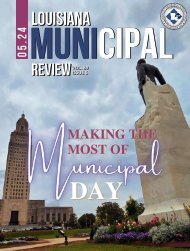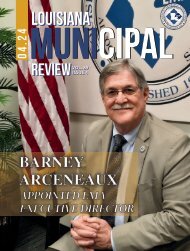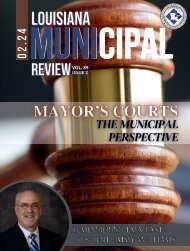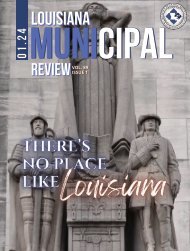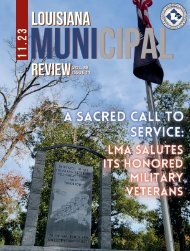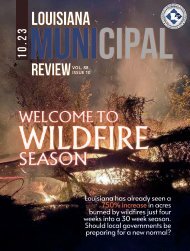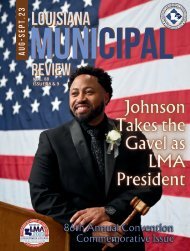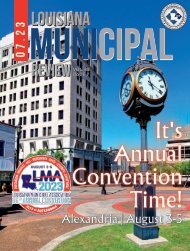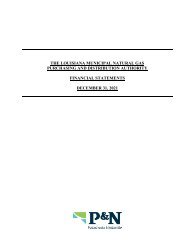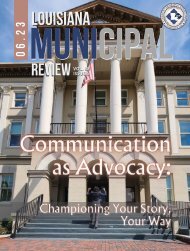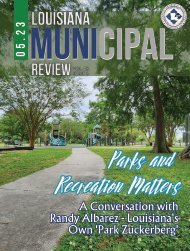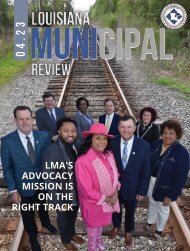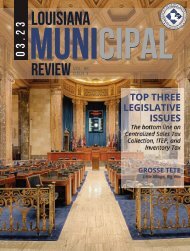Create successful ePaper yourself
Turn your PDF publications into a flip-book with our unique Google optimized e-Paper software.
Louisiana Municipal Review
PUBLISHED BY THE LOUISIANA MUNICIPAL ASSOCIATION
VOL 85, NO. 9
SEPTEMBER 2020
"One disaster away from disaster."
LPS NEGOTIATES
AFFORDABLE PRICING
FOR OUTDOOR PUBLIC
INFRASTRUCTURE
INCLUDING PLAYGROUNDS,
LIGHTING AND FLAG POLES.
USE YOUR
SMARTPHONE
CAMERA TO
VISIT LPS &
CONTACT US
FOR MORE
INFO!
FLY FLAGS
WITH PRIDE
IN PARKS &
OTHER PUBLIC
SPACES!
LET LAMATS
KEEP COSTS
DOWN &
OLD GLORY
FLYING HIGH
The Louisiana Municipal Review, the official publication of the Louisiana Municipal Association, serves as a medium for the exchange
of ideas and information for municipal officials in Louisiana. With a circulation of over 3,200, this publication is read by employees of
Louisiana municipal governments, sheriffs, parish presidents, state government officials, and members of the state legislature and
Congressional delegation, among others. Subscription rate: $24 per year; Single copy: $2. Louisiana residents, add 9% sales tax.
Rates for display, professional-listing, and classified advertising available upon request at editor@lma.org.
Statements or expressions of opinions appearing herein are those of the authors and not necessarily those of the Louisiana
Municipal Association. Publication of any advertisement shall not be considered an endorsement of the product or service involved.
No material from this publication may be reprinted without the express permission of the editor.
Editorial offices: Louisiana Municipal Association, 700 North 10th Street, Suite 400, Post Office Box 4327, Baton Rouge, LA 70821-
4327, editor@lma.org, www.lma.org, (225) 344-5001, (800) 234-8274, FAX (225) 344-3057.
LOUISIANA MUNICIPAL REVIEW
MUNICIPAL REVIEW STAFF
(USPS 832-560) (ISSN 0164-3622)
Executive Director: John Gallagher jgallagher@lma.org
3 rd class postage paid at
Managing Editor: Karen Day White kwhite@lma.org
Baton Rouge, Louisiana.
Postmaster – Send address changes to:
Editor: Anita Tillman atillman@lma.org
LOUISIANA MUNICIPAL REVIEW
Production Coordinator: Baton Rouge Press, Inc.
Post Office Box 4327
Baton Rouge, LA 70821-4327
2020-2021 LMA EXECUTIVE BOARD (non-affiliate, non-advisory)
President – Jimmy Williams – Mayor, Sibley
District J Vice President – Rodney Grogan, Mayor, Patterson
First Vice President – Michael Chauffe – Mayor, Grosse Tete LMA Past President – Barney Arceneaux, Mayor, Gonzales
Second Vice President– Jennifer Vidrine – Mayor, Ville Platte LMA Past President – Glenn Brasseaux, Mayor, Carencro
Immediate Past President – Harry Lewis – Mayor, Rayville
LMA Past President – David Butler, Mayor, Woodworth
District A Vice President – Peggy Adkins, Mayor, Sarepta
LMA Past President – David Camardelle, Mayor, Grand Isle
District B Vice President – Ronny Walker, Mayor, Ruston
LMA Past President – Clarence Fields, Mayor, Pineville
District C Vice President – Adam Holland, Mayor, Oak Grove LMA Past President – Norman Heine, Councilman, Baker
District D Vice President – Rick Allen, Mayor, Leesville
Vice President at Large – Mark Piazza, Mayor, Abbeville
District E Vice President – Nathan Martin, Councilman, Pineville Vice President at Large – Darnell Waites, Mayor, Baker
District F Vice President – Charles James, Mayor, Sunset
Vice President (< 1K) – Kevin Colligan, Mayor, Cankton
District G Vice President – Kenneth Stinson, Mayor, Vinton
Vice President (1K – 2.5K) – Johnny Natt, Mayor, Mangham
District H Vice President – David Toups, Mayor, Addis
Vice President (2.5K – 5K) – Robert Hardey, Mayor, Westlake
District I Vice President – Vacant
Page 2
LMR | SEPTEMBER 2020
Inside the LMA
Director’s Viewpoint
RECOVERING AND REBUILDING
BY JOHN GALLAGHER, EXECUTIVE DIRECTOR
“When the burdens of the
presidency seem unusually
heavy, I always remind myself
it could be worse. I could be a
mayor.” This quote by the 36th
President of the United States, Lyndon B. Johnson,
was invoked by Lake Charles Mayor Nic Hunter
during his introductory remarks for an August 19th
virtual press conference sponsored by the LMA and
the National League of Cities. Those words proved
prophetic when, only one week later, Lake Charles felt
the full brunt of Hurricane Laura, the most powerful
storm to hit Louisiana in 150 years. Laura wrought
catastrophic destruction throughout the city, along
with devastating infrastructure, homes, and businesses
in other southwest Louisiana municipalities, including
DeQuincy, Sulphur, Vinton, DeRidder, and Westlake.
The storm continued its path of ruin through central
and north Louisiana, prompting the issuance of
hurricane warnings in Ruston and Shreveport for
the first time ever. A sobering fact that puts things
into perspective for me: over 20,000 miles of power
lines were felled by the storm, almost enough to
circumnavigate the globe. In all, 23 parishes have been
declared as federal disaster areas.
As the mayors of these municipalities strive to
effectively manage disaster recovery, many continue
to struggle. Thank you to all of the LMA members who
have sent essential workers to these areas, opened
shelters for those who have been displaced, and sent
critical supplies to throughout the state. Governor
Edwards, GOHSEP, and state agencies have been
boots-on-the ground since before the storm made
landfall and they continue to work around the clock in
collaboration with federal partners to move recovery
efforts along as quickly as possible. But efficient
and successful recovery also demands public-private
partnerships, so we are particularly grateful to all
of the utility companies, communications providers,
and the Louisiana Rural Water Association for their
diligence in restoring infrastructure so we can get our
fellow Louisianans back home to safely rebuild.
Of course, this recent storm devastation occurred
against the backdrop of the ongoing COVID-19
pandemic. Louisiana is still number one per capita
in infections, though, thankfully, recent statistics
have demonstrated a decline in both infections and
hospitalizations. The fiscal crisis
facing LMA members across
the state because of the
pandemic also continues
to build. Tax revenues,
fees, and other sources of
revenue have drastically
declined, making it
difficult for municipalities
to continue to provide basic
services as part of the ongoing
fight against COVID-19.
As mentioned above, a virtual press conference was
held on August 19, during which Mayor David Butler
of Woodworth, Mayor Ronny Walker of Ruston,
Mayor Ben Zahn of Kenner, and Mayor Nic Hunter of
Lake Charles spoke about the effects that declining
revenue is having on their respective budgets and
operations. All four mayors emphasized the need
for direct aid to local governments as part of the
next stimulus package, an issue that is currently
locked in a congressional stalemate. I urge you to
contact our congressional delegation and tell them
that direct funding to locals is a critical part of a
successful economic recovery, not only in Louisiana,
but throughout the United States. Thank you again
to Mayors Butler, Walker, Zahn, and Hunter for their
eloquence and insight. We were very pleased with the
statewide media coverage that we received on this
critical issue.
Regretfully, Hurricane Laura forced postponement of
the remainder of the workshops for the 2020 LMA
Virtual Convention. I felt it was necessary to do so for
our many members who were affected by the storm,
so that they may focus on recovery at this time. We
will announce new dates for those workshops, along
with details about the award ceremony for winners of
our annual Community Achievement Awards.
Please continue to take care of yourselves and each
other and keep those affected by Hurricane Laura
in your thoughts and prayers. If you would like to
contribute funds or other donations to the affected
areas, please contact area United Way offices, the Red
Cross, or other reputable non-profit or faith-based
organizations in these areas.
LMR | SEPTEMBER 2020 Page 3
President’s Message
NEIGHBORS HELPING NEIGHBORS
BY MAYOR JIMMY WILLIAMS, TOWN OF SIBLEY
Our state is hurting and like Louisianans
have demonstrated time and time
again, when life gives us lemons, we
have a seafood boil. Just like in the
good times when neighbors come
together around a table spread with crawfish, corn and
potatoes - when times are bad, neighbors come together to
help each other. Whether it’s clearing a downed tree, serving
hot meals, delivering supplies, or comforting a family who
has lost everything, we find a way to stick together. Hurricane
Laura delivered a devastating blow, but we will fight
our way back and with everyone pitching in, we can come
back stronger.
I believe two of the most valuable things I can offer at this
time are my prayers to all affected and information to help
us rebound quickly. The staff at LMA has compiled many of
the resources and information that is critical to the recovery
of our citizens. Please share the following information as we
continue to pray for one another, especially for those who
have lost loved ones and their homes during this tragic time.
FEMA Hurricane Laura Assistance Available
As of September 15, FEMA has approved 21 Louisiana parishes
for Individual Assistance following Hurricane Laura.
Federal FEMA assistance can include grants for temporary
housing and home repairs, low-cost loans for uninsured
property loss and other programs to help people and businesses
recover from
Hurricane Laura.
People who sustained
losses in
Hurricane Laura
in the designated
parishes of Acadia,
Allen, Beauregard,
Caddo, Calcasieu,
Cameron, Grant, Jackson, Jefferson Davis, LaSalle, Lincoln,
Morehouse, Natchitoches, Ouachita, Rapides, Sabine, St.
Landry Vermilion, Vernon, Winn and Union can begin applying
for assistance today by registering online at http://
www.DisasterAssistance.gov or by calling 1-800-621-FEMA
(3362) or 1-800-462-7585 (TTY) for the hearing and speech
impaired. The toll-free telephone numbers will operate from
7 a.m. to 10 p.m. (local time) seven days a week until further
notice.
• To apply for an SBA loan, visit https://disasterloanassistance.sba.gov/s/.
SBA has also opened a Virtual
Business Recovery and Virtual Disaster Loan Outreach
Center, which can be reached at FOCWAssistance@sba.
gov or via phone at 1-800-659-2955 from 8:00 AM -
8:00 PM.
• Pre-register for the Disaster Supplemental Nutrition
Assistance Program (DSNAP) here: http://www.dcfs.
louisiana.gov/page/360.
FEMA Denials:
• Individuals with homeowner’s insurance who have
been denied by FEMA will need to submit further documentation
from your insurance provider regarding
deductible amounts and the level of coverage that you
are receiving. FEMA is working to update their online
systems to more accurately reflect this status.
Emergency Shelter:
• Residents in need of emergency shelter should text
LASHELTER to 898-211 for information on where to
go or call 211.
• Find information about emergency shelters in the
surrounding region at https://www.disasterassistance.
gov/information/immediate-needs/emergency-shelter.
Operation Blue Roof:
Operation Blue Roof has been approved and is setting up
operations in Southwest Louisiana. The program, which is a
joint effort through the Army Corps of Engineers and FEMA,
provides the installation of temporary roofing protection for
residential properties, at no cost to homeowners. Operation
Blue Roof provides critical assistance for those who either
can’t afford or are physically unable to install tarps. Homeowners
must sign a Right-of-Entry request allowing access
to their property to perform an assessment, and if warranted,
install a temporary roof.
• To register, call 1-888-ROOF-BLU (1-888-766-
3258) or sign up at https://blue-roof-online-signup-usace.hub.arcgis.com/.
• Learn more about the program at https://www.usace.
army.mil/Missions/Emergency-Operations/National-Response-Framework/Temporary-Roofing/.
Utility Outages:
Utility providers are working around the clock to restore
power services and repair damaged infrastructure. To track
current outages, visit https://lpsc.louisiana.gov/Outages/
Map/nrs.
Page 4
LMR | SEPTEMBER 2020
Inside the LMA
HUD Announces Disaster Assistance for Victims of
Hurricane Laura
Foreclosure protection offered to displaced families
The U.S. Department of Housing and Urban Development
(HUD) has announced federal disaster assistance for the
State of Louisiana to provide support to homeowners and
low-income renters displaced from their
homes in areas affected by Hurricane
Laura.
The President’s declaration allows HUD
to offer foreclosure relief and other
assistance to impacted families living in
these counties. HUD is:
• Providing immediate foreclosure
relief – HUD’s automatic 90-day moratorium on foreclosures
of Federal Housing Administration (FHA)-insured
home mortgages commenced for the Louisiana
counties covered under the Presidential declaration on
the date of the declaration. For assistance, call your loan
servicer or FHA’s Resource Center at 1-800-CALL FHA
(1-800-225-5342);
• Making mortgage insurance available – HUD’s Section
203(h) program provides FHA insurance to disaster
victims whose homes were destroyed or damaged to
such an extent that reconstruction or replacement is
necessary and are facing the daunting task of rebuilding
or buying another home. Section 203(h) borrowers
are eligible for 100 percent financing, including closing
costs;
• Making insurance available for both mortgages and
home rehabilitation – HUD’s Section 203(k) loan
program enables those who have lost their homes to
finance the purchase or refinance of a house along
with its repair through a single mortgage. It also allows
homeowners who have damaged houses to finance the
rehabilitation of their existing single-family home. For a
list of lenders in your area, call FHA’s Resource Center at
1-800-CALL FHA (1-800-225-5342); and
• Making information on housing providers and HUD
programs available – The Department will share information
with the Federal Emergency Management
Agency (FEMA) and the State on housing providers that
may have available units in the impacted counties. This
includes Public Housing Agencies and Multi-Family
owners. The Department will also connect FEMA and
the State to subject matter experts to provide information
on HUD programs and providers.
• Read about these and other HUD programs designed
to assist disaster victims at https://www.hud.gov/info/
disasterresources.
Disaster Records Recovery Information from Louisiana
Secretary of State’s Office
As Louisianans across our state deal with the aftermath of
Hurricane Laura, please be assured that staff at the Louisiana
State Archives, Secretary of State Kyle
Ardoin’s Office is here to assist with
records disaster recovery advice and
resources. Local, parish, and state
employees affected by the storm will
have the challenges of both personal
and professional recovery measures.
Recovery and remediation, when possible,
of records and artifacts of the
State of Louisiana is vital to the preservation of our history.
Information about disaster recovery can be found on the
Secretary of State’s website at sos.la.gov.
State and local agencies in Louisiana are required to report
damage to public records to the Secretary of State’s Office
under Louisiana R.S. 44:411 and 44:423. This includes all
damage to paper or electronic records from minor damage
to total loss. To report damaged records, please fill out the Records
Damage Assessment Worksheet and send the completed
form to disasters@sos.la.gov.
If you have any questions about records recovery and preservation,
you can contact the Louisiana State Archives’ disasters
team at 225-922-1218 or by emailing disasters@sos.la.gov.
We are happy to do whatever we can to assist our colleagues
facing these difficult times.
Waiving/Reducing Water Bills
Normally, Article VII, Section 14 of the Louisiana Constitution
would prohibit a municipality from reducing or waiving
a high water bills caused by a leak on the customer’s side
of the meter. In most
circumstances, the
municipality may only
offer a payment plan
to the customer and
even then, may have
to charge interest if
the payment period is
prolonged. However,
the Attorney General’s
Office has opined that when the damage to the customer’s
side of the line is caused by a natural disaster, a public body
MAY waive or reduce the bill. It is strongly suggested that if
a municipality opts to reduce or waive such excessive utility
bills, that they develop guidelines for when and how they
will do so in advance. Such waivers and reductions should be
equitably and consistently applied.
LMR | SEPTEMBER 2020 Page 5
Gov. Edwards Outlines COVID-19 Restrictions as
Louisiana Moves Cautiously into Phase 3 Until October 9
Gov. John Bel Edwards has released details of his proclamation
moving Louisiana’s response to COVID-19 to Phase 3. Some
businesses will be able to increase their occupancy, and bars may
reopen subject to certain restrictions, only in parishes that do
not have high incidence of illness and only if local governments
choose to opt in.
“We have seen some improvement in decreased COVID-like
illness, new COVID cases and hospitalizations in recent weeks,
as our strong mitigation measures are working. That said, I want
the people of Louisiana to know that moving into Phase 3 does
not mean that COVID is no longer a problem for us because in
fact it is. That’s why it is incumbent upon all Louisianans to follow
the guidance, wear their masks and avoid going out when they
are showing symptoms,” Gov. Edwards said. “We all want to see
a return to normalcy, but it is going to take all of us working
together to get us there. There are still some looming factors
that could come to bear on the fragile gains that we have made
including students returning to schools at all levels, the outcome
of the Labor Day weekend and the displacement of thousands
of residents by Hurricane Laura from an area that had among
the highest case counts in the state. If we see a spike in cases, we
may be forced to go back to a more restrictive Phase 2.”
“I also want people to be realistic, as Phase 3, with perhaps some
relatively minor modifications, is likely where we stay until a vaccine
is widely available,” Gov. Edwards said. “That doesn’t mean
that there won’t be minor changes, but we are going to see
things like the statewide mask mandate and crowd size limits in
place for quite some time in our state and also across the nation.”
The new order will expire on October 9. In it, restaurants, churches,
salons, spas, gyms and other businesses will be able to open
at a maximum of 75 percent of their occupancy, with social
distancing in place.
For now, bars will remain closed to on-premises consumption
in parishes with high incidence of COVID as evidenced by their
test positivity rate, which is a continued recommendation of
the White House Coronavirus Task Force, as cases among young
people and in college towns continue to grow.
Gov. Edwards’ order also outlines how bars may begin to re-open
for on-premises consumption in Louisiana in Phase 3, based on
the percent positivity of the parish for a two-week period. Parishes
with a positivity rate of 5 percent or lower for two consecutive
weeks may opt-in to open bars for on premises consumption,
under the restrictions in the Governor’s order.
This two-week percent positivity will be updated every two
weeks by the Louisiana Department of Health.
When re-opened, bars will be able to open at 25 percent capacity,
up to 50 people, indoors for customers seated for tableside
service. They may have no more than 50 customers outdoors,
socially distanced, seated for tableside service. No live music will
be allowed. All drinks must be ordered at the table and delivered
by bar staff to the table. Sale and service of alcohol at bars, when
they reopen, must end at 10 p.m., with all patrons cleared from
the building by 11 p.m. When re-opened, no one under the age
of 21 is permitted in any bar.
Phase 3 also prohibits the sale or service of alcohol for on premises
consumption at all establishments, including restaurants and
casinos, after 10 p.m.
The statewide mask mandate will stay in place under the new
order. Masks have proven to be a key mitigation measure in the
fight against the spread of COVID-19. The more Louisianans who
wear masks, the more Louisiana businesses can stay open.
The order continues to recommend those at higher risk of severe
illness from COVID-19 stay at home unless they must leave for
an essential activity, such as getting food or medical care. People
with higher risk include those with compromised immune systems,
those 65 and older and those with conditions like diabetes,
hypertension, heart or kidney disease and obesity. Consult the
CDC guidance on high risk conditions for more information.
Indoor social gatherings, like weddings or receptions, will be
limited to the lesser of 250 people or 50 percent capacity of the
facility. Outdoors, crowd sizes are limited to 50 percent capacity,
up to 250 people, if people will be in close proximity and social
distancing is not possible. Casinos will stay at 50 percent capacity
and 75 percent of their gaming positions under the new order.
Sporting events, like college football games, will operate at a
lesser capacity of 25 percent and without alcohol sales.
Nursing home visitation will be prohibited in Phase 3, but the
Louisiana Department of Health is working on a pilot program to
begin to allow visitation at nursing homes with no new cases for
14 days and in parishes without high numbers of COVID-19. LDH
will release details in the coming days.
Please go to gov.louisiana.gov to read the updated Phase 3 order
(117 JBE 2020 COVID 19 Public Health Emergency), which includes
the closure of bars to on-site consumption, the statewide
mask mandate and limitations on gathering size. It is important
to read the extension of emergency provisions (118 JBE 2020
Renewal of State of Emergency for COVID 19) that is also
extended to October 9.
The State Fire Marshal’s office and the Louisiana Department of
Health will share information with business owners via the Open
Safely portal, which is located at opensafely.la.gov. All business
owners are encouraged to read not only the executive orders,
but the relevant documents from Open Safely.
Page 6
LMR | SEPTEMBER 2020
Inside the LMA
Legal Briefs
SO, WHERE ARE WE NOW?
BY KAREN DAY WHITE, EXECUTIVE COUNSEL
Since 1976, the meetings of Louisiana’s
public bodies have been governed by our
Open Meetings Law (“OML”), which is now
codified in La. R.S. 42:11 et seq. In the 50
years since inception, the provisions have been amended and
refined to reflect the people’s sacred right to know as articulated
in Article XII, Section 3 of the Louisiana Constitution of 1974:
“No person shall be denied the right to observe the deliberations
of public bodies and examine public documents, except
in cases established by law.” One of the core tenets of the OML
is that meetings must be held in person.
Understanding all of the mandates and intricacies of the OML
was already daunting. Then along came COVID-19. As it became
apparent that Louisiana would not be spared from this
global pandemic, Governor Edwards began issuing a flurry of
executive orders aimed at providing legal clarity, protecting
the public, and, most importantly, slowing the spread of the
coronavirus. Among the first tranche of executive orders was
Executive Order 30 JBE 2020, which Governor Edwards issued
on March 16, 2020.
That order provided an exception to the OML requirement of
in-person public meetings as follows: (1) municipalities were
required to develop a means for council members to attend
essential meetings by teleconference or video conference;
(2) municipalities had to simultaneously develop a means by
which the public could observe and participate as otherwise
provided in the OML; (3) IF a council member wanted to participate
via remote means (or had to in order to comply with social
distancing mandates), and IF counting those participating
via remote means was required in order for the body to have
a quorum for conducting business, then remote participation
was an allowable exception to the OML during the pendency
of the public health emergency.
Utilizing the exact same language, this remote participation
process was extended via Executive Orders 41 JBE 2020, 52 JBE
2020, 59 JBE 2020, 75 JBE 2020, and 84 JBE 2020. So, for four
months, public bodies adapted to this new normal, developing
systems and integrating software to embrace remote attendance
by council/board members.
Then on July 23, 2020, the day before 84 JBE 2020 was set to
expire, 97 JBE 2020 was issued. Noticeably absent from this
new order was the remote attendance provision. So, does that
mean that we are back to the default OML mandate of in-person
meetings? Well, kind of.
During the 2020 Regular Session of the Louisiana Legislature,
the body nearly unanimously passed Act 302, which substantively
amended the OML to add an exception for meeting
during a gubernatorially declared disaster or emergency. La.
R.S. 42:17.1 became effective on June 12, 2020, creating a statutory
fix for meetings during states of emergency/disaster. The
law provides very clear boundaries and prerequisites for such
remote meetings. First and foremost, there is a requirement
that holding the meeting in person would be detrimental to
the health, safety, or welfare of the public.
But the most dramatic difference between the new law and
prior executive orders is the departure from a quorum-making
approach to a mandate that agenda items for these remote
meetings be limited to the following: (1) matters that are directly
related to the public body’s response to the disaster or
emergency and are critical to the health, safety, or welfare of
the public; (2) matters that if they are delayed will cause curtailment
of vital public services or severe economic dislocation
and hardship; and (3) matters that are critical to continuation
of the business of the public body and that are not able to be
postponed to an in-person meeting due to a legal requirement
or other deadline that cannot be postponed or delayed by the
public body.
The new law also provides clear notification requirements for
remote meetings. At least 24 hours prior to the meeting, the
municipality (in addition to posting the agenda at the location
of the meeting) must post the notice and agenda on its
website, email it to any member of the public or the news media
who requests notice of meetings of the public body, and
widely distribute the notice to every known news media outlet
that broadcasts or publishes news within the geographic area
within the jurisdiction of the public body. The notice must
be accompanied by detailed information about how the public
may participate in the meeting and submit comments on
agenda items.
Regarding the actual conduct of the meetings, the municipality
must provide a mechanism to receive public comment electronically,
both prior and during the meeting, and must ensure
that all parts of the meeting (other than executive session) are
clear and audible to all. Meeting participants must be clearly
identified, and public comments must be expressly identified,
acknowledged, and maintained in the meeting record.
It is likely that the subject of remote meetings will be revisited
in future legislative sessions. Technology and the changing
landscape of the modern workplace demand it. In the meantime,
remote meetings are reserved for dealing with time sensitive,
critical matters.
LMR | SEPTEMBER 2020 Page 7
LMA Virtual Workshops Postponed
The 2020 Annual LMA Convention workshops have
been postponed in the wake of the devastation left by
Hurricane Laura.
Hurricane Laura made landfall on August 27 and ravaged
Louisiana with wind and rain before moving north into
Arkansas. Currently, President Trump has approved Major
Disaster Declarations for 23 parishes: Allen, Beauregard,
Calcasieu, Cameron, Jefferson Davis, Acadia, Vermilion,
Catahoula, Grant, LaSalle, Natchitoches, Rapides, Sabine,
Vernon, Winn, Bienville, Claiborne, Red River, Caldwell,
Jackson, Lincoln, Ouachita and Union. Conservative
estimates indicate $9 billion in damages as hundreds of
thousands of Louisianans suffer through the sweltering
heat without power.
The LMA team is working diligently to assist its members
during this difficult time and is currently rescheduling
the virtual workshops for October 13 - 15 and October
20 - 22. For resources and assistance for victims of
Hurricane Laura, please visit the following:
• LMA Emergency Management Publications:
https://www.lma.org/LMA/Publications/
Emergency_Management/LMA/Publications/
Emergency_Management.aspx?hkey=b99b0258-
f839-49b2-b6a5-f568656b5df8
• Reimbursement for Transportation Facilities and
Assets:
http://www.ltrc.lsu.edu/ltap/emergencypreparedness.html
• Secretary of State’s Disaster Forms and Guidance:
https://www.sos.la.gov/
HistoricalResources/ManagingRecords/
DisasterPreparationAndRecoveryInformation/
Pages/default.aspx
The LMA’s disaster management and recovery expert,
Deputy Director of Disaster Response Brett Kriger, is
also available to assist LMA members with any questions,
including FEMA reimbursement, best practices, state
and federal mandates, and more. He may be reached
at bkriger@lma.org or 225-252-6118.
“Having spoken to mayors throughout the state,
the devastation is almost unimaginable,” said LMA
Executive Director John Gallagher. “For some, it may
be several weeks before power and water are restored.
As we strive to vigilantly assist our membership, those
affected by this terrible storm remain in our thoughts
and prayers. We encourage those who are able to do
so to contribute through one of the relief coordinating
agencies throughout the affected areas of the state.”
The LMA will publish a revised schedule of virtual
workshops once they are confirmed.
Page 8
LMR | SEPTEMBER 2020
Municipalities
LMA’s Strong Congressional Partnership
BY BRANDON BREWER, LMA LEGISLATIVE LIAISON
The Louisiana Municipal Association
prides itself on well-built
relationships with our congressional
delegation. Throughout the
year, LMA stays in constant contact
with the members and their staff
ensuring ways we can support
each other as it pertains to
local issues. The senators and
congressmen show continuous
support of our association by attending and addressing
our membership at the LMA Annual Mid-Winter
Conference and the LMA Annual Convention. This gives
LMA members a great advantage by hearing updates
directly from the federal level as well as building
relationships in person.
Each year, the congressional delegation welcomes LMA
members with open arms as we attend meetings and
receptions in Washington D.C. in conjunction with
the NLC Congressional City Conference. During these
visits, we engage the delegation and their staff about
the needs of our members as it relates to the success
of our communities. The ability to have face time with
the senators, congressmen, and the congressional
staff reinforces LMA’s relations on the federal level as
well as our members. Successful relationships bring
additional benefits to our membership. This past year,
U.S. Congressman Garret Graves took LMA members
on a private night tour to see iconic and historic rooms
of the United States Capitol including the Statuary Hall,
Rotunda, and House Chamber. A highlight of the evening
was standing out on the Speaker’s Balcony overseeing
Capitol Hill. The same balcony where Presidents, Popes
and other monumental leaders have stood. Over the last
several months, LMA’s close partnership in Washington
has proven to be a huge asset for our members.
2020 has already shaped up to be a challenging year for
local government. Louisiana’s cities, towns, and villages
have been hit hard by the COVID-19 pandemic. During
this crucial time, our congressional delegation has been
fighting to secure funds for local government and our
communities from lost revenues. Congress passed
a key piece of legislation regarding the pandemic.
The Coronavirus Aid, Relief and Economic Security
(CARES) Act provided payments to state and local
governments and to help them navigate the impact of
the COVID-19 outbreak on their communities. Senator
Bill Cassidy helped introduce the State and Municipal
Aid for Recovery and Transition Act (SMART), which
has not passed in the Senate as of now. Protecting
essential municipal employees from being laid off is
a key component of the SMART Act. Police officers,
firefighters, teachers, sanitation workers and other
municipal personnel are essential to our communities.
Senator John Kennedy’s Coronavirus Relief Fund
Flexibility for State and Local Government Act has been
included in the Senate’s coronavirus relief package.
The bill would give state and local governments more
flexibility as they use funds provided by the Coronavirus
Aid, Relief and Economic Security (CARES) Act.
The Coronavirus Relief Fund Flexibility for State and
Local Government Act would allow states and local
governments to use CARES Act funding for operating
expenses unrelated to the coronavirus. This bill does
not allow officials to spend this CARES Act money
on shoring up their pension funds. The CARES Act
established the $150 billion Coronavirus Relief Fund,
which has provided payments to state, local and tribal
governments to help them respond to the coronavirus
pandemic. Every state received at least $1.25 billion from
this allocation.
Municipal budgets are being depleted and this funding
is vital to sustain local government. The Louisiana
delegation played a crucial role and took the lead back
home to ensure that local government’s needs are a top
priority. LMA is continuing to assist the congressional
delegation to alleviate the hardships felt by our members
during this pandemic. LMA and our members are urging
Congress for direct funding to help offset diminished tax
revenues.
Negotiations are currently at a standstill between the
House and Senate leadership over the HEROES Act
passed by the House of Representatives in the House
and the recently introduced Senate HEALS Act. A key
disagreement is whether to provide direct funding to
states and local governments to help offset diminished
revenues to address continued COVID-19 efforts. Efforts
to use flexibility in the use of CARES Act funds similar
to the Kennedy bill have been floated by the Senate
leadership as a compromise, however it likely will not
benefit Louisiana municipalities, as the $525 million in
CARES Act funds appropriated to local governments will
likely be used. The LMA and National League of Cities
held a virtual press conference August 19 featuring four
Louisiana Mayors: Ronny Walker of Ruston, David C.
Butler of Woodworth, Nic Hunter of Lake Charles and
Ben Zahn of Kenner. The mayors discussed employment,
small business, and infrastructure challenges their
LMR | SEPTEMBER 2020 Page 9
municipalities are facing. Theses mayors supported
and urged Congress to provide direct funding to local
governments to address the diminished revenues. This
has become even more urgent with the catastrophic
effects of Hurricane Laura as it affected Lake Charles,
Ruston and Woodworth.
The LMA reached out to all members of the Louisiana
Congressional Delegation to get their thoughts on these
issues. Below are the responses we received to the
following questions:
-What are your top legislative priorities that affect local
government?
-What is your position on direct assistance to local
government as it relates to expenses?
-How will you aid in the economic recovery?
Their plans and actions will be vital for the future success
of municipalities. Here is what they had to say:
Senator Bill Cassidy (R)
“I do not want to see a situation where cities slash police
budgets and force layoffs of those who put their lives on
the line to keep us safe. We cannot let Americans down
in this time of tremendous need. Congress must work
together to deliver the support they need, and we’ll be
stronger as a nation for having done so.”
“Local community leaders know the challenges facing
them in the COVID-19 recovery. Perhaps the biggest
is the budgetary shortfall created by the economic
lockdown. The SMART Act is necessary to keep local
essential workers employed. I appreciate those on the
frontlines for their support.”
Senator John Kennedy (R)
“For months, state and local governments have been
working under the weight of an incredible health crisis.
Giving those governments the flexibility to help their
communities weather this pandemic—by using money
they already have—is a no-brainer. I’m glad to see this
commonsense provision in the Senate’s relief package.”
Congressman Clay Higgins (R) District 3
“I supported the CARES Act, which provided Louisiana
with $1.8 billion for state and local governments. That
bill also provided an additional $270 billion for state
and local governments through various grant programs
and formula allocations. Much of this funding has not
yet been disbursed or still needs to be administered at
the state level. We’re pushing to expedite these existing
relief funds for municipalities.”
“The greatest stimulus that we can provide is to fully
reopen our economy. Getting Americans back to work
and rebuilding our economic engines are top priorities
and necessary for long-term recovery. “
“We are directly helping Louisiana citizens every day.
My office has spearheaded an outreach initiative to
bring Veterans services to communities across South
Louisiana, and we’ve opened and closed over 3,000
constituent cases in the District.”
“Additionally, my office is working closely with our
federal and state partners to prioritize Louisiana’s
needs. This includes resources for dredging and flood
mitigation, transportation infrastructure, and the current
public health response. We’re working closely with
President Trump and his administration to put Louisiana
and our communities first.”
Congressman Mike Johnson (R) District 4
“The coronavirus pandemic has wreaked havoc on state
and local government budgets as sales tax and other
revenue streams have dried up. In an effort to respond to
this, the CARES Act appropriated over $1.8 billion to the
state of Louisiana, but very little of that funding has been
passed by the state to our parishes and municipalities.
That should change, but the most important thing
we can do to address this crisis is to get revenues
Before digging, call 811
at least two full work days in advance.
That’s all it takes to notify Louisiana 811
members, so they can mark nearby utility
lines and pipelines to prevent injury and
costly accidents.
IT’S THE LAW. IT’S FREE.
Call or click www.Louisiana811.com
Page 10
LMR | SEPTEMBER 2020
Municipalities
flowing again by opening up the economy as quickly
and as safely as possible. In the meantime, Congress
is currently debating further assistance to state and
local governments, but we must ensure that any future
funding is targeted so that taxpayer dollars are not used
to bail out certain states for their decades of poor fiscal
decisions.”
Congressman Garret Graves (R) District 6
“When things are working the way they’re supposed
to, local government survives and thrives in proportion
to the surviving and thriving of the people it serves.
If anything is clear six months into a pandemic, it’s
this: things are not working the way they’re supposed
to. From the federal perspective, the most effective,
long-term support the federal government can deliver
to municipalities is policies that encourage safe and
productive economic activity. With that as the primary
objective of federal policymaking, circumstances
may also require the federal government to step in in
more substantial ways. And Congress has been doing
that, passing multiple pieces of legislation providing
direct, boots-on-the-ground assistance. Passage of the
CARES Act in March, for example, delivered federal
relief and recovery to health care workers, individuals
and families, and job creators in Louisiana and helped
stabilize our local economies and communities.”
“This crisis has dragged on much longer than any
of us anticipated, and the federal response must
continue to be multi-faceted and dynamic. Yet, even in
Dual Officeholding
these unprecedented times, local figures remain best
suited to determine the pandemic’s impact in their
communities and to put the appropriate mitigation
and other strategies in place to protect the health and
well-being of its people and its future. I’ll continue to
push for policies that help make that happen. That’s
why I recently introduced bipartisan legislation in the
House of Representatives that would empower local
business owners to safely reopen without having to
fear a frivolous COVID-19 lawsuit. Our bill protects job
creators who take follow safety and other guidelines
to prevent the spread of the virus so that they can
re-open and help restart local economies. Most
importantly, our legislation is the result of ongoing
dialogue we’ve had with local officials and small
business owners like you and is just one example of the
kind of policies needed as we move forward – but it’s
not enough. More needs to be done, and I look forward
to continuing to hear from you.”
We encourage our members to stay engaged on
federal issues that impact Louisiana, and your local
community. Please reach out to your congressman and
senators and let them know the needs of the locals are
important to Louisiana’s success. A strong partnership
between local and federal leaders is what is needed to
move us forward. We greatly appreciated the time each
congressional member has given to this association
and their continued support of local government.
Attorney General’s Opinions
BY JEFF LANDRY, ATTORNEY GENERAL
Prohibited Donations
Opinion: 20-0084 The Abbeville Housing
Authority may pay its general counsel
a monthly flat-fee retainer if such fee
does not violate La. Const. art. VII, § 14.
Released: 8/3/2020
Opinion: 20-0040 The provisions of the Dual Officeholding and
Dual Employment Law do not prohibit a full-time employee of
the Iberville Parish Department of Public Works from serving as
a contract employee of the Iberville Parish Parks and Recreation
District. Released: 8/4/2020
Local Government Budget Act
Opinion: 20-0004 A mayor and board of aldermen of a Lawrason
Act municipality may not alter the amount appropriated
to the police department in a previously adopted municipal
budget except by amending the budget in accordance with
the provisions of the Local Government Budget Act. Released:
8/13/2020
Open Meetings
Opinion: 20-0098 The Open Meetings Law does not prohibit
members of a public body from attending open public meetings
as citizens. Released: 8/19/2020
Civil Liability
Opinion: 20-0108 La. R.S. 17:439.1 and La. R.S. 9:2800.25 provide
immunity from civil liability for COVID-19 claims under certain
circumstances. Released: 9/4/2020
Elections
Opinion: 20-0104 A voter who is diagnosed with COVID-19 or
is subject to a quarantine order while awaiting a COVID-19
diagnosis would qualify to vote absentee so long as a medical
professional certifies that the voter is disabled. Released:
9/1/2020
LMR | SEPTEMBER 2020 Page 11
LaMATS Board Leadership Confirmed
The LaMATS Board of Directors approved its proposed
2020-2021 slate of members and officers on July 28, and
the list was ratified the following day at the annual LMA
stockholders meeting.
Officers named for the coming year are: Ville Platte
Mayor Jennifer Vidrine (President); St. Francisville Mayor
Billy D’Aquilla (Vice President); and Crowley Councilman
Vernon “Step” Martin (Secretary/Treasurer). Rayne
Mayor Chuck Robichaux was selected to serve as an
officer upon Mayor D’Aquilla’s expected retirement
at the end of 2020. Other Board members include
Carencro Mayor Glenn Brasseaux; Woodworth Mayor
David Butler; Grand Isle Mayor David Camardelle; Grosse
Tete Mayor/LMA First Vice President Michael Chauffe;
Pineville Mayor Clarence Fields; Rayville Mayor Harry
Lewis; Pineville Councilman Nathan Martin; Farmerville
Clerk Gay Nell Pepper (CMC); Baker Mayor Darnell
Waites; Sibley Mayor/LMA President Jimmy Williams;
and LMA Executive Director John Gallagher. LaMATS
staff members are: Executive Director, Cliff Palmer, and
Program Manager, Mary Joseph.
LaMATS thanks all our dedicated Directors and looks
forward to the coming year of progress in service to
Louisiana’s local governments.
IMMEDIATE PROGRAM ENROLLMENT OPPORTUNITIES
The time is now to enroll your municipality into the
LaMATS Insurance Premium Tax (IPT) and Occupational
License Tax (OLT) collection services, both of which
begin annually each January. LaMATS long-running IPT
program collected a total of $23.5 million in revenue
this year for the more than two-thirds of Louisiana’s
local governments that participate. Collecting
important revenues and sparing members considerable
administrative effort, LaMATS growing OLT program is
delivered by leading provider Avenu Insights & Analytics
(formerly RDS), and offers a robust, user-friendly
platform approved by municipal staff and local business
owners nationwide.
LaMATS is also accepting September enrollments
in our new Franchise Fee Audit service, designed to
increase municipal revenues from utility providers,
such as regional cable and electric companies, whose
contracts with local government often predate current
administrations and rarely receive thorough review of
terms for regulatory or market changes that may benefit
municipal coffers.
Contact Executive Director Cliff Palmer (cpalmer@
lamats.net) to inquire about participation in these or any
LaMATS program.
Hail and Farewell to Marlaine Peachey
The LaMATS and LMA staff will miss our dear friend and
colleague, Marlaine Peachey, as she prepares to retire
with her boss, Mandeville Mayor Donald Villere, after 20
years of municipal service. As the Executive Assistant
to the Mayor and past LMA Executive Board member as
President of the La. Association of Municipal Secretaries
and Assistants (LAMSA), Marlaine has played a vital
role over the years planning LMA District meetings
and coordinating important training conferences for
LAMSA. Marlaine has dutifully served three Mandeville
mayors, a local fire district as board secretary, and Vice
Chair of the St. Tammany Parish Tourist Commission.
And in her spare time, she authored the Christianbased
book, “Sharing Your Love Story,” has charmed
audiences around the country as a gifted speaker, and
taught weekly Bible classes to women and children.
John Gallagher (LMA Executive Director), Myra Walker
(LAMSA President and Walker clerk), and Cliff Palmer
(LaMATS Executive Director) said of Marlaine, “she is
a true professional in every sense with a genuine and
caring heart for all. We will miss her creative ideas and
energy in the workplace, and wish her much happiness
in her next journey.”
ENVIRONMENTAL
TECHNICAL SALES, INC.
7731 Office Park Blvd.
Baton Rouge, LA 70809
(225) 295-1200 (225) 295-1800 (fax)
Daniel Hebert, President
Ronnie Hebert, Chairman
Brady Sessums, Vice President
www.etec-sales.com
Water … Wastewater … Sludge
Odor Control…Pumping
Equipment Systems…Solutions
Page 12
LMR | SEPTEMBER 2020
A Word from
Our Affiliates
Jennifer Vidrine Billy D’Aquilla Vernon “Step” Martin Chuck Robichaux
Glenn Brasseaux David Butler David Camardelle Michael Chauffe Clarence Fields
Harry Lewis Nathan Martin Gay Nell Pepper Darnell Waites Jimmy Williams
John Gallagher Cliff Palmer Mary Joseph
LMR | SEPTEMBER 2020 Page 13
J
John Gallagher, LMA
Cliff Palmer, LaMATS
Page 14
LMR | SEPTEMBER 2020
Partner Insight
Rural Development
USDA Rural Development Helps Rural Communities Thrive
BY ROY HOLLEMAN, STATE DIRECTOR, USDA RURAL DEVELOPMENT
It is imperative for our rural municipalities
to update critical drinking water and
wastewater infrastructure. Modern
water systems are vital not only to
public health, but also the economic vitality in creating and
maintaining thriving rural communities.
If you need help financing new infrastructure or expanding
your current water system, USDA Rural Development stands
ready to help. Afterall, everyone should have access to safe
drinking water.
Through the USDA Rural Development Water and Waste
Disposal Loan and Grant Program, loans, grants and loan
guarantees are available for drinking water, sanitary sewer, solid
waste, and storm drainage facilities. USDA can partner with
rural communities, water districts, and other eligible entities to
build or improve water infrastructure systems in rural areas of
50,000 or less.
Eligible borrowers are local governmental entities, non-profit
organizations, and federally recognized tribes. Preplanning
and other technical assistance may be available to financially
distressed rural communities for improvements to their water
system. Funding can also be used for legal and engineering
fees, land acquisition, water and land rights, permits and
equipment.
For example, USDA recently funded the following four
projects through the Water and Waste Disposal Loan and Grant
Program.
· Zone Two Water System received $972,000 to replace water
mains, meters, and construct an Architectural Barriers Act
Accessibility Standard meeting room.
· Town of Colfax received $2,237,000 to drill two water
production wells, replace deteriorated aerator, repair
leaking water lines, and update water meters.
· Town of Tullos received $1,165,000 additional funding to
construct a water treatment plant.
· Waterworks District #2 of St Landry Parish received
$2,158,000 to add water softeners, install ground storage
tank, and replace service pumps. Additional improvements
are a new building, generator, and replacing aging water
meters.
Rural Development offers easy terms for rural communities
with limited resources. Very low-interest loans are currently
available for eligible borrowers. Interest rates can be as low as
1.125% and grants may be combined with a loan if you qualify.
Applications are accepted year-round. Eligible rural
communities and water districts can apply online with RD Appy
for funding to maintain, modernize, or construct water and
wastewater systems.
Rural Development partners with the Louisiana Rural Water
Association and others to help with day-to day operational,
financial, management issues, and assist with energy audits.
Contact the local specialist in your area. Louisiana’s RD Area
Offices are in Monroe (318) 343-4467, Natchitoches (318) 352-
7100, Lafayette (337) 262-6601, and Amite (985) 748-8751.
The Louisiana team is here to help guide you with obtaining
infrastructure upgrades necessary to maintain the social,
economic, and environmental health of your community.
Please contact Roy Holleman at roy.holleman@usda.gov or
(318) 473-7657. For more information, visit www.rd.usda.gov/la
and follow @RD_Louisiana on Twitter.
LMR | SEPTEMBER 2020 Page 15
BY LIEUTENANT GOVERNOR BILLY NUNGESSER
No doubt, this is a trying time for the people
of our state. But one thing is for sure,
the people of Louisiana are resilient, giving
and brave (just to name a few).
I have been actively involved in natural
disaster situations since Hurricane Katrina,
the BP Oil Spill and five other hurricanes.
I have seen the amazing work of grass
roots organizations, and even organizations
emerging out of necessity following
these devastating events. One thing is
for certain: volunteers are vital in times of
disaster. Volunteer Louisiana is THE go-to
source of information for anyone wanting to help. Whether you
want to donate a gift of time, money or supplies, Volunteer Louisiana
has a database of organizations using volunteers in disaster
response and recovery. You can also register your organization on
our website so interested persons can connect with you directly.
In times of crisis, Volunteer Louisiana is the go-to source for help.
Did you know:
• Louisianans volunteer over 129 million hours per year, with
an annual economic impact of $2.8 billion for our state.
• Volunteer Louisiana has hosted 19,950 AmeriCorps members
who have provided over 7 million hours of community
service in education, disaster response, environmental
stewardship, economic opportunity, and healthy futures.
• Volunteer Louisiana has awarded over $196,000 in grants
to seventy nonprofits and local schools since 2010. 35,000
volunteers provided 175,000 hours of service which made
an economic impact of $3.7 million.
Right now, join the thousands of others making a permanent and
immediate difference in the lives of our fellow Louisianans most
in need. Go to www.VolunteerLouisiana.org, today!
We are #LouisianaStrong!
Volunteer Louisiana, the one-stop shop
to donate, give and make a change
Lt. Gov. Billy Nungesser handing out water in Lake Charles.
Catholic Charities – Group
from St. Thomas More
Catholic High School cut up
and hauled trees that fell on a
home in North Lafayette.
Photo by Catholic Charities
UL Lafayette AmeriCorps
distributing food and water
Operation BBQ – Serving hot meals to survivors after Hurricane Laura.
Photo by Operation BBQ
Page 16
Mercy Chefs – Providing meals. Photo by Mercy Chefs
LMR | SEPTEMBER 2020
Damage Assessment is Critical to Recovery
MUNICIPAL RESPONSIBIITY FOR REPORTING DAMAGES
The FEMA disaster assistance programs in many ways function
like your insurance policy on your home, business or car.
In the event that damage occurs, it is up to you to report your
damage to the insurance company, provide evidence of the
cause, and cooperate with a claims adjuster to ensure you are
fairly compensated. FEMA, like the insurance company, has no
responsibility if you fail to report the damage, don’t provide required
documentary evidence, receipts, invoices, or don’t cooperate
with the claims adjuster who inspects your property damage.
Even after you report the damage, if you don’t carefully monitor
and participate in review of the claims adjuster findings and report,
you may not be fairly treated or fully recover your costs in
accordance with your policy.
FEMA is the insurance company for the disaster and the
policy coverages are laid out in the Stafford Act.
PURPOSE OF THE DAMAGE ASSESSMENT
Damage assessment is the process of determining the location,
nature, and severity of damage sustained by the public and
private sectors after a disaster. The typical damage assessment
estimates for municipality, parish, and local governments are a
shared responsibility.
But, local municipalities are the ones who will suffer for
failure to fully document and report their damages.
The role of the parish and local governmental units in the damage
assessment process is to provide a strong damage assessment
supported by accurate information that will:
• Identify the needs of individuals and communities affected
by the disaster.
• Determine the support needs where local resources are insufficient
to address recovery
• Identify, allocate and prioritize the state and federal resources
that are needed for the response and recovery efforts.
DAMAGE ASSESSMENT PROCESS
The term Preliminary Damage Assessment (PDA) is generally used
by FEMA and the State because it is usually conducted before a
disaster declaration is made. Assessing the damage caused by
a particular event is normally a three-phased process with each
phase of the process serving a distinct purpose.
However, completing Phase 3 is critical even if Phases 1 and 2 are
skipped due to an expedited Presidential Disaster Declaration.
• Phase 1 begins immediately after the disaster, but in some cases
may begin during the event. Its purpose is to be prepared to respond
to any immediate requests for assistance and support for
protective measures.
• Phase 2 is a more detailed look at the needs and usually occurs
prior to a request for federal or state assistance, so that the
most accurate and timely information can be included in the
Governor’s request. In the event of a high visibility disaster the
Governor may request and the President may grant an expedited
Disaster Declaration.
• Phase 3 takes place after receiving a federal or state declaration.
Its purpose it to review and update the information previously
Feature
gathered in order to prioritize the delivery of assistance and ensure
that each jurisdiction’s damages are being considered for
response, recovery, reimbursement and mitigation grant funding
by FEMA and other federal agency emergency assistance programs.
The Preliminary Damage Assessments (PDAs) reporting
and inspection process will qualify you (or NOT) for
FEMA Public Assistance (PA).
FEMA Expectations from the PDA:
FEMA’s main goal is to verify and validate damages in the field
with accurate documentation provided by locals who experienced
the event. Since they are the agency evaluating the need
of an area to receive federal aid, their expectations differ from
those of the impacted state and local governments.
FEMA expects:
• annotated maps showing damage locations at the time of
the Joint PDA.
• local governments and agencies provide photographs, videos,
media articles of damages
• local governments and agencies to produce clear damage
cost estimates that are backed up by clear calculations, invoices,
load tickets, payroll information, volunteer sign-in
sheets, etc.
PDA Team Roles:
The damage assessment process is a joint local, state, federal effort
that needs local involvement to ensure all damages are reported
and documented properly.
• FEMA representative acts as the team leader.
• State representative serves as a mediator between FEMA
and the locals or individuals
• Parish EM Directors typically go around with the FEMA/
State team on the PDA.
• Parish EM Directors reach out to local representatives to explain
to FEMA and the State the extent and impact of damages
(i.e. “what happened and why it matters”).
• Local representatives must be knowledgeable about damage
calculations and detailed cost descriptions (i.e. “a ton of
gravel in our community costs $X from Materials Provider”)
Final Thoughts on PDA and Eligibility for Reimbursement
It is critical to document and report all damages – even those that
a state or FEMA inspector or official tells you is not likely to be
eligible for reimbursement. In major disasters, there are normally
“Unmet Needs” recovery grant funds that are made available for
damages and impacts that were not otherwise eligible for disaster
designated federal assistance programs.
One criterion for applying for those funds is usually that the damage
was documented, reported to FEMA, and ruled “ineligible” for
reimbursement.
If the damage was not reported and ruled ineligible for
reimbursement by FEMA, it is not likely to be eligible for
these special recovery grant funds.
LMR | SEPTEMBER 2020 Page 17
Louisiana Mayors Urge Congress to Take Action on Direct
Federal Aid to Municipalities Impacted by COVID-19
On August 19, the Louisiana Municipal Association (LMA)
hosted a press conference with mayors from across the
state to discuss the economic effects of the COVID-19
crisis on Louisiana’s municipalities and the need for
urgent action at the federal level to ensure cities, towns
and villages can continue to provide essential services
to keep their communities safe and support the
national economic recovery. Mayors Ronny Walker of
Ruston, David Butler of Woodworth, Nic Hunter of Lake
Charles and Ben Zahn of Kenner discussed employment,
small business, and infrastructure challenges their
municipalities are facing due to the ongoing pandemic
and why stalled negotiations in Congress must resume in
order to help communities in Louisiana recover from the
economic downturn caused by COVID-19.
To watch the full press conference,
visit the LMA website at www.lma.org.
“For our small businesses to come back fully within the
City of Ruston, they’ve got to have essential infrastructure
and services in place. We cut our budget this year
by $3.5 million dollars, most of that was for infrastructure
projects that we could have done, so I would say to
Congress: please help us,” Ruston Mayor Ronny Walker
said. “We wouldn’t have had to cut a single person from
our payroll if Congress had done for cities what they did
for businesses. If we could get the same payroll protection
plan that small and large businesses got, that would
be a great help to us in Northeast Louisiana.”
“We certainly hope that Washington would take a look
at us – we’re small, we’re rural, but we’d a whole lot
rather the money come directly to us than go through
the bureaucracy. We need every penny of that to work
with to go back to some normality of business,” Woodworth
Mayor David Butler said. “A number of our members
of Congress live in small municipalities, and it’s
their municipalities also that are asking for help. Without
the infrastructure – the water, sewer and gas – the
economic effects of maintaining that begin to get larger
and larger.”
“We need to provide police, fire, water, sewage, and garbage
collection just like everybody else, and right now
we need the federal government’s help – we don’t need
it forever, we just need it now. I’m a lifelong Republican,
I’ve always felt that the federal government should let
us manage our own affairs right here in our own cities
and parishes, but I speak to them now saying we need
your help now,” Kenner Mayor Ben Zahn said. “We’re
asking for as much as we can get right now because
we’re all feeling that. We need small businesses, big
businesses and government working together to continue
our services.”
“The fiscal impacts of the pandemic have certainly been
a punch in the gut – we expect our sales tax revenue to
be down anywhere from 6 to 10 percent once it’s already
said and done. We are happy to know we do expect
some relief from the CARES Act, but certainly nothing
to the extent that would allow us to continue on with
the growth and progressive nature that we want to as
a city,” Lake Charles Mayor Nic Hunter said. “We need a
hand up, not a handout. I do not believe this is a Kenner
problem, a Lake Charles problem, a Woodworth problem
or a Ruston problem – this is an American problem, and
this is a municipal problem for every municipality in this
country. If Congress really wants to get serious about
putting people back to work, they need to be thinking
long-term, not just putting a band-aid on the situation.”
Page 18
LMR | SEPTEMBER 2020
Feature
Bossier: 1
Ouachita: 2
Tensas: 1
Avoyelles: 1
Rapides: 1
Lafayette: 2
Calcasieu: 1
Baton Rouge: 10
Tangipahoa: 1
New Orleans: 1
Mississippi: 1
• Potable and Wastewater Treatment
• LDH Certified Operator Training
• LDH Certified Management Training
• LDH Certified, Licensed Operator Staffing
• LDH Certified, Licensed Management
• Long, Short and Emergency Staffing/Management
• Administrative Order and Compliance Assistance
• Certified Lab Testing and Compliance Sampling
www.tmbwater.com (800) 762-9104
LMR | SEPTEMBER 2020 Page 19
Preparing for and Responding to Hurricane Laura
and Other Disasters During the COVID-19 Pandemic
BY BRETT KRIGER, LMA DEPUTY DIRECTOR OF DISASTER RESPONSE
Louisiana municipalities are facing two
serious threats: Hurricane Laura and the
COVID-19 pandemic. How do leaders
and professionals in healthcare, public
health, and emergency management
cope with this combined challenge to
protect people in the communities they
serve as they face multiple, complex
disasters and emergencies at the same
time?
Planning for tropical storms, hurricanes and other potential
disasters is stressful and difficult even in normal times. Because
the 2020 hurricane season comes during the coronavirus
(COVID-19) pandemic, the preparedness, response,
and recovery process goes from difficult and challenging to
practically overwhelming.
Our public health
and emergency response
professionals
have provided
advice to help
municipal officials
safely prepare, evacuate,
and shelter
for severe storms
that can help you
protect yourself
and others from
COVID-19. Our
friends, family, and
neighbors in the
western part of the state are already facing the complexity
of surviving the aftermath of Hurricane Laura when shelter,
hotels, electricity, food, and water are all in short supply.
The COVID 19 threat even makes it difficult for responders,
utility workers, debris removal teams, and FEMA to get help
into the disaster zone. The shortage of safe operating, living,
and staging locations for all those critical workers is a daunting
challenge.
Limited Shelter for Evacuees
“Our small town of DeQuincy was hit
by Hurricane Laura to the point of
devastation. However, by the Grace
of God, hard-working employees,
great citizens working together, and
volunteers from all over the US, we
are making progress toward restoration.
We may have a small town,
but we have BIG Hearts and those
hearts are shining bright during
these dark days.”
- Mayor Riley Smith, DeQuincy
FEMA will adjust polices to allow state and local officials
to execute non-congregate sheltering in the initial days of
an incident. Non-congregate shelters include, but are not
limited to, hotels, motels, and dormitories. FEMA Regional
Administrators have delegated authority to approve requests
for non-congregate sheltering for hurricane-specific disasters
for the 2020 season. While not a single solution, this funding
will assist with sheltering
operations in
the short-term.
The severe limitations
on shelters
being opened for
evacuees from
Hurricane Laura risk
areas and nursing
homes led many
to plan for staying
with friends or family.
That is a great
option if you have
that opportunity
but if you will be
staying with friends
or family outside
your household to
evacuate from the storm:
“Pineville is accustomed to being a
place of refuge for those impacted
by hurricanes but this time we are
the ones being impacted. We’ve
seen tremendous efforts by our
public works crews and public
safety employees to maintain city
services and keep our citizens safe.
We’re especially thankful for Cleco
and their many supporting contractors
from 16 other states who are
restoring power to our region, including
roughly half our city. As we
move forward into this recovery let
us continue to work together until
all of our citizens are fully restored."
- Mayor Clarence Fields, Pineville
• Talk to the people you plan to stay with about how you
can all best protect yourselves from COVID-19.
• Consider if either of your households has someone
who is at higher risk of developing severe illness from
COVID-19, including older adults or people of any age
who have underlying medical conditions. Make sure
everyone knows what they can do to keep them safe
from COVID-19.
• Follow everyday preventive actions, including covering
coughs and sneezes, washing your hands often, and
avoiding touching your eyes, nose, and mouth with
unwashed hands. Consider taking extra precautions for
Page 20
LMR | SEPTEMBER 2020
Feature
ALWAYS ON
FOR YOU.
JOHN M. SCHRODER, SR.
Louisiana State Treasurer
LAMP, Inc. President
Louisiana local government entities trust LAMP to protect their
principal, deliver solid returns, and ensure same-day access to
their funds from anywhere. We have guided our clients through
challenging environments over the past quarter century — and
we remain ready to serve you now.
Find out how our consistent, conservative portfolio management
can help your organization navigate uncertain times.
THEODORE C. SANDERS, III
Chief Executive Officer
LAMP, Inc.
LOUISIANA ASSET MANAGEMENT POOL
Call 800-249-LAMP or visit www.lamppool.com to learn more.
No transaction fees | Same-day access to your entire investment | Rated AAAm by Standard & Poor’s
You may incur fees associated with wires and/or ACH transactions by your bank, but there will be no fees charged from LAMP for such transactions. A ‘AAAm’
rating by S&P Global Ratings is obtained after S&P evaluates a number of factors including credit quality, market price exposure, and management. Ratings are
subject to change and do not remove credit risk. Investment involves risk including the possible loss of principal. No assurance can be given that the performance
objectives of a given strategy will be achieved. Past performance is no guarantee of future results. Any financial and/or investment decision may incur losses.
LMR | SEPTEMBER 2020 Page 21
“Laura was like nothing I’ve ever seen. The massive
sustained winds and blinding rains devastated our
homes and businesses. We estimate that about 10-15%
of our residents’ homes have been damaged beyond
repair and will have to be demolished. We were able to
start debris management early, but we would not have
made the progress that we have without the incredible
outpouring of support from our neighbors in Texas and
our fellow Louisianans. I cannot sufficiently express how
deeply grateful I am to the mayors and council members
who have provided not only food and supplies, but also
kind words of encouragement that we sorely needed in
the wake of this disaster. They have my heartfelt thanks.”
people living in close quarters.
• Know what to do if someone in your family or in the
household you are staying with becomes sick with
COVID-19.
Response and Recovery After A Hurricane
The loss of basic infrastructure resources like safe drinking
water and electricity are always huge impacts after a disaster
event but COVID 19 makes it certain that restoration will take
longer than usual. Since restoration will take longer than following
a typical disaster the stress on residents will be much
greater than normal.
The use of personal generators is common to provide limited
survival capability to run a refrigerator, cooktop, or small
air conditioning unit. But, generators produce dangerous
exhaust and risk of electrocution by back-powering electrical
lines that may be exposed. Several deaths occurred following
Hurricane Laura due to carbon monoxide poisoning from
generators being run inside homes or not properly ventilated.
Virtual Preliminary Damage Assessments
- Mayor Kenny Stinson, Vinton
The severe limitations on responders, damage inspectors and
recovery officials being able to enter and operate in a disaster
area due to COVID 19 has led FEMA to consider new methods
"The City of Westlake took a hard hit from Hurricane
Laura. Our City Hall building lost several walls. Ninety
percent of homes here suffered some kind of damage,
and 40% of homes are uninhabitable. I am proud that
through all of this, our Public Works Department kept our
water and sewer services going. Our Police Department
and Fire Department have done a great job to keep
things as safe as possible for our citizens. Together, we
will get through this."
- Mayor Bob Hardey, Westlake
of conducting damage assessments. FEMA regions may elect
to utilize virtual or desktop Preliminary Damage Assessment
(PDA) capability. Virtual PDAs may include use of aerial
imagery, HAZUS software modeling, or applicant submitted
data, documentation, and photos. Such information submission,
if authorized, is certified by local officials or emergency
managers with detailed and verified statements to document
damages as accurately as possible.
Such virtual assessments have limitations and may be backed
up with onsite validation. But, the reduced risk to inspection
teams, as opposed to conducting physical, in-person assessments
of cost, work, facility, and applicant eligibility may
make this option the preferred choice. If FEMA personnel do
deploy to the field, the plan will be to use as few personnel as
possible.
Individual and Households Programs and Direct Housing
FEMA does not
anticipate major
changes in program
eligibility, timeliness
of grant awards, or
the level of assistance
provided
under the Individual
and Households
Program. However,
the delivery
mechanisms of
certain aspects of
the program will be
modified. FEMA will utilize remote inspections and field work
to evaluate damage as much as possible, with the goal of
expediting the delivery of recovery assistance.
FEMA will only conduct remote inspections on homes where
occupants have indicated a higher degree of damage when
they registered for assistance. For applicants who self-report
minor damage and can remain in the home, FEMA will determine
whether an inspection is necessary, enabling FEMA to
focus its limited resources on those with the greatest need.
These remote inspections and field work, consistent with
eligibility, will support numerous programs including Rental
Assistance, Home Repair Assistance, Replacement Assistance,
Other Needs Assistance for Personal Property, and Assistance
for Miscellaneous Items. Types of Other Needs Assistance that
do not require an inspection, including childcare, transportation,
medical and dental, funeral expenses, moving and
storage, and procurement of Group Flood Insurance Policies,
will be administered as normal.
Direct Housing
“We are resilient people in Sulphur,
with the tendency to put our own
issues aside to work with each
other to rebuild. It is a difficult
time, but a hopeful time to see
the little miracles that take place
every day with all the help from
our city workers, first responders,
relief groups, and residents. Day by
day things are getting better in our
community.”
- Mayor Mike Danahay, Sulphur
FEMA does not anticipate changing the criteria necessary for
approving a request for Direct Housing. However, given the
Page 22
LMR | SEPTEMBER 2020
Feature
“So many have lost so much. The
needs are great. We’re doing our
best to meet them and we’re so
grateful for those who have traveled
from near and far to help us. It’s
heartbreaking, but we’re not hopeless.
We wake up to new progress
every day. DeRidder will be back.
We’ll be stronger and more resilient.”
- Mayor Misty Clanton, DeRidder
challenges associated
with implementing
some forms of
Direct Housing in a
COVID19 environment,
FEMA may
rely more on certain
forms of temporary
housing (i.e., rental
assistance) and
non-congregate
sheltering.
For new disasters that are approved for Direct Housing, FEMA
will prioritize the placement of Transportable Temporary
Housing Units on private sites and the use of Direct Lease.
As for any other disaster, the limitations on use of temporary
housing in coastal zones subject to storm surge and flooding
will be significantly limited.
Public Assistance
Like Hurricane Laura, any disaster that occurs during the
COVID 19 Presidentially Declared Disaster will challenge municipal
officials with record keeping and documentation. All
eligible and reimbursable costs must be tracked and reported
separately to FEMA. We faced the same problem in the past
when Hurricanes Katrina, Rita, Gustav and Ike struck many
of the same communities and created similar damages. The
accounting difficulty can be described as challenging but is
essential. FEMA
tracks, reimburses,
and audits the costs
and eligible reimbursable
projects
as independent
events. It is the
applicant’s responsibility
to accomplish
the reporting
and reimbursement
request process.
The basic principles,
application procedures,
eligibility,
“I don't want Americans to forget
about the need here in Lake
Charles. One of the greatest American
cities, Lake Charles, was hit with
the strongest hurricane to hit the
state of Louisiana in 150 years. We
are resilient, we are strong, we’re
going to help our brothers and sisters,
but we also need our American
brothers and sisters to remember
us and we’re going to need your
help. This is truly going to be a
herculean effort.”
- Mayor Nic Hunter, Lake Charles
Galene Means Water
Galene Means Water
• Corrosion Resistant Package
Water/ Wastewater Plants
• Plug and Play Filtration Skids
• High Efficiency RO Trains
• Self-Cleaning Screens
• Glass Fused Steel Tanks
Lower costs,faster installation and easy maintenance!
www.galenewt.com 844-942-5363
LMR | SEPTEMBER 2020 Page 23
“Taking a direct hit from a Cat 2 hurricane was the worst
feeling I have ever had. Not because I was worried about
my stuff or even my neighbors’ stuff - I was worried about
lives being lost. In Louisiana, we don’t wait for handouts
or big government to bail us out. We roll up our sleeves
and go to work, and that’s exactly what happened. Vernon
Parish had no power left anywhere but several hundred
of us went to work on getting groceries, water, ice
and many other supplies. We are feeding 15,000 people
per day with donated food and volunteer labor. We will
overcome this tragedy one day, but we can never come
up with the right words to say to the family that lost their
14-year-old daughter. God help us to be kind and thankful
for every day we have with our family and friends."
- Mayor Rick Allen, Leesville
and award mechanisms of the Public Assistance (PA) program
will remain unchanged in the COVID 19 environment. However,
most PA work will be conducted virtually. Recipients
should be prepared to conduct virtual applicant briefings,
with virtual participation by FEMA.
The Recovery Scoping Meeting to develop the Program Delivery
Plan and discuss damage inventory will also be conducted
remotely. Recipients and subrecipients should be prepared
for virtual applicant engagement to work through program
delivery, formulate projects, and upload documentation. FEMA
will conduct inspections remotely whenever possible.
While remote inspections may not be possible for all applicants,
the dual use of remote and in person inspections
expedites the delivery of recovery assistance to grant recipients
and reduces the number of personnel required in the
field. For some incidents, FEMA may still deploy PA personnel
to perform specific activities, such as critical infrastructure
stabilization coordination or just-in-time site inspections,
which cannot be completed virtually. FEMA will continue to
provide technical assistance to grant recipients and applicant
personnel through virtual training, job aids, online how-to
videos, the Grants Portal Hotline, virtual mentorships, and
remote customer assistance.
Final Thoughts on Disasters in the Time of Pandemic
Planning for and operating in any major disaster is usually
enough to last any municipal official a lifetime. The challenges
to response and recovery are daunting and the risks
to residents, businesses, and economy can seem dire. The
need to focus on issues posed by the COVID-19 environment
impacts operational concepts such as sheltering plans, commodity
distribution, and establishment of disaster facilities.
With many FEMA personnel working remotely, municipal
leaders should be prepared to conduct disaster work virtually,
including using available media to ensure survivors
are aware of and understand the changes to the application
process, holding virtual townhalls throughout response and
recovery, and conducting virtual coordination meetings
with volunteer organizations and the private sector.
If the communications lifeline is impacted by follow-on
disaster events, stabilization will be even more essential
to support remote work. When additional resources—personnel,
commodities, contract support, mutual aid—are
needed to support
changes within the
COVID-19 environment,
municipal
leaders and emergency
managers are required
to assess, find
solutions, and act.
As we continue
to move through
hurricane season, we
will be called on to
lead, innovate, and be
resourceful to address
challenges and adapt
disaster operations
to meet the needs
of survivors in a very
complex and dangerous
environment.
“For the first time in the history
of Ruston, Category One Hurricane
Laura came into our town.
The city sustained major damage
to our power grid losing
95% of power. Our Wastewater
Treatment Plant and water wells
were carried by backup generators
which eliminated any issues.
As we sit here a week later,
the city has restored the 95%
of power lost as well as our city
fiber which was also down. The
City of Ruston continues to show
its tenacity and resilience in the
face of adversity. This community
has proven time and time
again we are Ruston Strong!”
- Mayor Ronny Walker, Ruston
PRESORT
STANDARD
U.S. POSTAGE
PAID
BATON ROUGE, LA
PERMIT #319
Page 24
LMR | SEPTEMBER 2020



